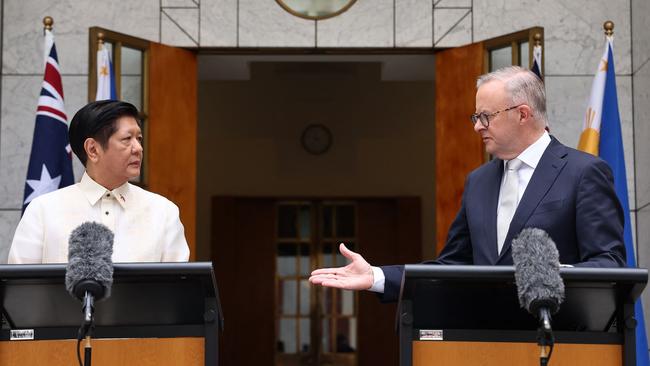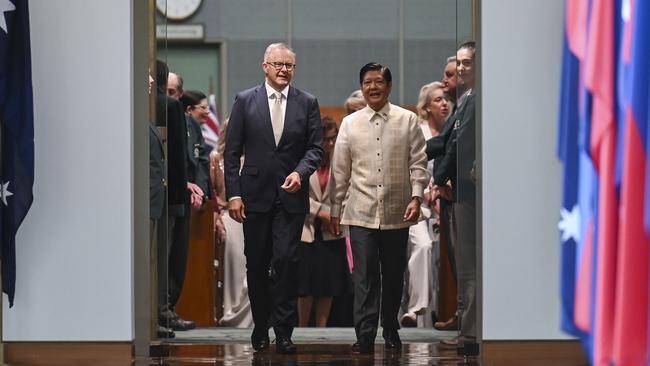Philippines President warns of ‘threat to peace’ akin to eve of WWII
Philippines President Ferdinand Marcos Junior has urged Australia to work together as the stability of the Indo-Pacific region comes under threat.

Philippines President Ferdinand Marcos Jr has urged Australia to work with his country as the stability of the Indo-Pacific region comes under threat, warning the Philippines finds itself “on the front line against actions that undermine regional peace”, as it did before World War II.
Mr Marcos, widely known as Bongbong, said he would not allow a foreign power to “take even one square inch of our sovereign territory”, as his country’s long-running maritime dispute with China intensifies.
Without naming China directly as the perpetrator, Mr Marcos used his address to the Australian parliament on Thursday to push for deeper co-operation between the two countries to combat the threat to the rules-based order that “no single force can counter them by themselves”.
“We have long known that our prosperity and development are anchored on the peace and stability of the Indo-Pacific,” he said.
“Today, that peace, that stability, and our continued success have come under threat. Once again, we must come together as partners to face the common challenges confronting the region.”
Anthony Albanese spruiked Australia’s strong ties with the Philippines ahead of the ASEAN summit in Melbourne next week, backing Mr Marcos’s stance on the South China Sea dispute and stating that the relationship was a “recognition of our regional responsibility”.
The Prime Minister’s remarks come as China ramps up its activities in the contested South China Sea, with the leaders signing an agreement to enhance their maritime co-operation, bolster defences against cyber attacks and enhance competition law.

In 2016, an international tribunal ruled largely in favour of the Philippines, finding that China’s claim was unlawful.
“For both of us, the United Nations Convention on the Law of the Sea is not an abstract notion or a theoretical question,” Mr Albanese said. “Freedom of navigation is fundamental to our sovereignty, our prosperity, our security and our territorial integrity.”
Mr Albanese also announced a $20m package to support the Philippines to reform its justice system.
Mr Marcos acknowledged Australia’s “indisputable role as a regional stabiliser” and upholder of the rules-based order, touching on the two nation’s shared history of repelling the Japanese during World War II.
“This is why our strategic partnership has grown more important than ever,” he said.

“We must reinforce each other’s strengths, we must protect the peace that we fought for during the war and have jealously guarded in the decades since.
“We must oppose actions that clearly denigrate the rule of law. As in 1942, the Philippines now finds itself on the front line against actions that undermine regional peace, erode regional stability, and threaten regional success.”
Peter Dutton commended the Philippines for its resolve during “times of embolden autocrats and belligerent regimes who show utter contempt for sovereignty, law and liberty”.
“Your country shows resolve, because your country knows the threats are real,” the Opposition Leader said.
“For many years the Philippines has been on the front lines, subjected to grey-zone activities. And I commend you for your personal resolve, Mr President, for you and your country’s courage in calling out acts of coercion and the Philippines’ steadfast commitment to international law.”
Greens foreign affairs spokesman Jordon Steele-John criticised the Philippines’ record on human rights, calling on Labor to recognise recent violations.
“Successive Filipino governments have a long history of human rights abuses,” he said.




To join the conversation, please log in. Don't have an account? Register
Join the conversation, you are commenting as Logout